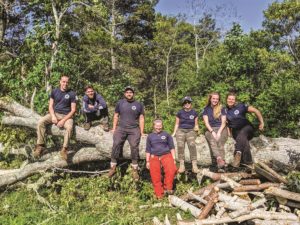WELLFLEET — AmeriCorps member Corrine Losch received an email on May 15 telling her she had two weeks to move out of the Wellfleet house where she had been lodging since September. She and eight other workers and a house supervisor packed up and left.
They left behind seven months of environmental protection, preservation, and disaster response work on Cape Cod through AmeriCorps, which has been serving the area since 1999. They also left behind anxiety about exposure to Covid-19 — exacerbated by living in cramped quarters.
The coronavirus shut down the state in mid-March, but AmeriCorps Cape Cod kept its members working until the end of May. While that may have made sense, given their outdoors-oriented assignments and participants’ desires to keep working, the groups’ living conditions — up to four people in one bedroom sharing the same bathroom — were cause for concern, said Kelsey Leahy, a Bourne-based member from Beverly.
Barnstable County Administrator Jack Yunits, who oversees AmeriCorps Cape Cod, said he began to worry in March, when Alex Davies, a corps member living in the Bourne house, tested positive for Covid-19. She self-isolated in her room, and her fellow members brought her food and water.
At that point, according to Yunits, AmeriCorps Cape Cod members were given the option to return home. But most, including everyone in the Wellfleet house on Pamet Point Road, stayed.

Leahy now says that if AmeriCorps had shut down earlier it would have saved members a lot of stress. At the same time, she said she is glad she could continue her work.
Leahy helped set up fences for plover nests in Dennis, a job she thinks would not have been done without AmeriCorps.
When a new batch of workers arrives on Cape Cod in September, the program will look different, Yunits said. He is looking to buy another house in Chatham to hold five people, which would cut occupancy in the Wellfleet house in half. He will also take on fewer members overall, though he is not sure how many fewer.
AmeriCorps deploys groups of young people around the country, 10 months at a time, to aid local governments and nonprofits. The Cape Cod branch, which focuses on the environment, employs 24 members living in houses in Bourne, Barnstable, and Wellfleet.
While corps members up Cape dealt with an infected colleague, they worried especially about their colleagues in Wellfleet, because the house here is more cramped than any other.
“It’s really not possible in that house to be completely cut off,” Leahy said. “There is no way, because you have to share the bathroom and you have to share the kitchen.”
Yunits worried about Wellfleet, too. “We had 10 in Wellfleet and nobody wanted to leave,” he said.
Losch, who is from Littleton and whose assignment was with the Center for Coastal Studies, said the Wellfleet crew had a plan to move anyone with symptoms into an empty room.
When testing was finally offered in May, however, as the program was being closed, none of the eight tested in Wellfleet were positive. But by then, corps members’ confidence in their health and in testing was apparently shaken.
Many members declined the test because “they just assumed they already had it,” Leahy, the Bourne-based participant, said.
Yunits and corps members offer conflicting accounts of whether it was Covid-19 or the fear of it that brought about the early closure of the AmeriCorps season.
Leahy said, “I know from people in the Wellfleet house near the end that somebody started showing symptoms. I don’t know a lot of details, but after Wellfleet people started showing symptoms, that’s when we got the email to leave.”
When asked if any members at the Wellfleet house were moved out of their rooms because of symptoms, Losch said, “I personally didn’t move out of my room. That’s all I can say.”
Program administrators, however, said they canceled the program not due to Covid-19 itself, but due to mental health issues brought on by fear and anxiety.
“At the end, people would start to panic. If they had any symptoms at all, they thought they had it,” Yunits said. “We decided it’s getting too scary, the kids are on each other, everybody is worried.”
“I don’t know what that means,” said Los Angeles resident Celia Davolos, a corps member who stayed in the Wellfleet house while serving the town’s conservation trust.
Members will get the $6,000 educational stipend for their work, which they can put towards tuition or paying off student loans. They have stopped getting their $300 bi-weekly salary, however. The program was supposed to run through July 23.
